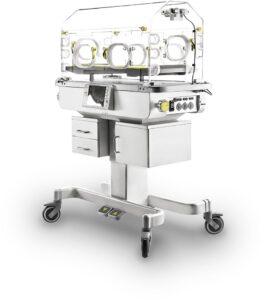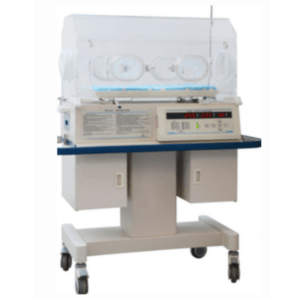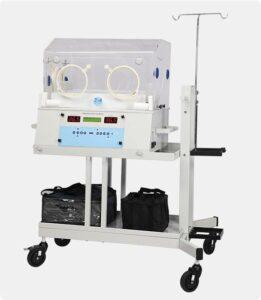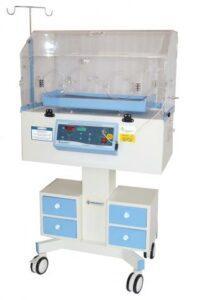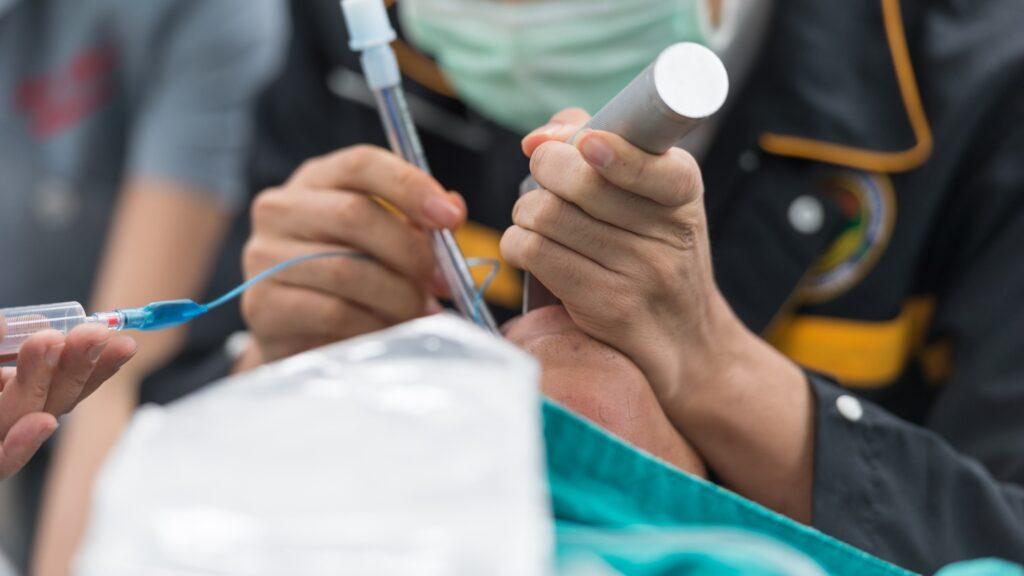In this blog, we will explore the extraordinary world of infant incubators and the invaluable role they play in creating a safe haven for our most precious lives. In the realm of neonatal care, these remarkable devices serve as guardians of hope, offering a sanctuary for fragile infants in their earliest and most critical stages of life. Within the warm confines of these technological marvels, a delicate balance is strucka balance between providing a nurturing environment and safeguarding against the uncertainties that can arise in a newborn’s journey.
Infant incubators are not merely sterile boxes, they are vessels of life, carefully engineered to mimic the womb’s protective embrace. From premature babies who enter the world too soon to those born with medical complications, these tiny souls find solace within the walls of these specialized chambers.
Through this blog, we embark on a fascinating exploration of the wonders that infant incubators hold. Join us as we celebrate the dedication of medical professionals engineers and researchers who tirelessly work to improve the lives of our tiniest and most vulnerable population. Together, we will uncover the transformative impact of these safe havens for precious lives, and gain a deeper appreciation for the marvels of modern medicine. Prepare to be inspired by tales of love, compassion, and the unwavering commitment to nurturing the miracles that rest within the confines of infant incubators.
Understanding the Infant Incubators
Infant incubators are specialized medical devices designed to provide a controlled and safe environment for newborn infants particularly those who are premature have low birth weight or experiencing medical complications. These remarkable machines act as a surrogate womb, recreating optimal conditions necessary for the fragile lives they cradle.
Infant incubators play an important role in neonatal care due to their ability to create a controlled and safe environment for critical newborn infants. Infant incubators serve as lifelines, ensuring that the unique needs of premature, low birth weight, or medically compromised infants are met with precision and care. They provide a crucial foundation for their survival, growth, and development, offering hope and support to both infants and their families during a critical time.
Types of Infant Incubators
There are several types of infant incubators used in neonatal care each can provide optimal care for newborn infants. Here are some common types.
- Closed Incubators: Closed incubators are fully enclosed units that create a controlled and isolated environment. They are equipped with transparent walls, allowing healthcare providers to monitor the infant without disturbing their surroundings. Closed incubators provide precise regulation of temperature, humidity, and oxygen levels.
- Open Incubators: Open incubators, also known as radiant warmers, are designed with an open-top or partially open design. They use overhead heating elements or radiant heat sources to provide warmth to the infant while allowing easier access for medical procedures. Open incubators are commonly used for stable infants who require less intensive care.
- Transport Incubators: Transport incubators are specifically designed for safely transporting critically ill or premature infants between healthcare facilities. They are equipped with additional features to ensure stability during transport, such as shock absorption, battery backup systems, and secure restraints.
- Hybrid Incubators: Hybrid incubators combine the features of closed and open incubators. They have a closed environment for precise control of temperature, humidity, and oxygen levels, but also incorporate an open access area for medical interventions and easier caregiver access.
- Isolettes: Isolettes, also known as bassinets or baby warmers, are smaller versions of incubators used for short-term care or as an intermediate step between incubator care and room air. Isolettes provide a warm and protected environment, but they may not have the same level of advanced monitoring and control as full-sized incubators.
- Mobile Incubators: Mobile incubators are portable units designed for use in remote or emergency settings. They are lightweight, compact, and often battery-powered, enabling healthcare providers to provide immediate care to infants in challenging environments.
Each type of incubator serves a unique purpose in neonatal care, catering to different medical requirements, transportation needs, and levels of intervention. The choice of incubator depends on the condition of the infant the level of care required and the specific resources available in the healthcare setting. By utilizing these various types of incubators, healthcare providers can offer tailored and specialized care to meet the needs of every precious life in their care.
Features of Infant Incubators
Infant incubators have various features designed to provide care and support for newborn infants. Here are some common features found in modern infant incubators.
- Temperature Control: Incubators have precise temperature control systems to maintain a stable and warm environment. They can regulate both air and mattress temperatures to ensure the infant’s body temperature remains within the desired range.
- Humidity Control: Infant incubators offer humidity control mechanisms to maintain an appropriate level of moisture in the air. This helps prevent the infant’s skin from drying out and minimizes fluid loss.
- Oxygen Delivery and Monitoring: Many incubators are equipped with integrated systems for delivering and monitoring supplemental oxygen. They can accurately control the oxygen concentration and monitor oxygen saturation levels in the infant’s blood.
- Phototherapy Lights: Incubators designed for infants with jaundice feature built-in phototherapy lights. These special lights emit a specific wavelength that helps break down excess bilirubin in the baby’s blood, reducing the risk of complications.
- Access Ports: Incubators are designed with access ports or openings to allow medical professionals to perform necessary procedures without disrupting the controlled environment. These ports enable caregivers to administer medications, draw blood samples, or insert intravenous lines while minimizing disturbances.
- Integrated Monitoring Systems: Advanced incubators often incorporate monitoring systems to track vital signs such as heart rate, respiratory rate, and oxygen saturation levels. These systems provide continuous monitoring and alerts to detect any deviations or potential issues.
- Weighing Scales: Many incubators have built-in weighing scales, allowing healthcare providers to monitor the infant’s weight regularly. This feature helps assess growth and nutritional needs accurately.
- Sound and Light Control: Infant incubators are designed to minimize external stimuli, including noise and bright lights, to create a calm and soothing environment for the infant’s development. They may include features such as sound insulation, dimmable lights, and privacy covers.
- Air Filtration: Incubators have an air filtration system to keep a clean and sterile environment which helps in reducing the risk of infection.
- Integration with Medical Equipment: Some incubators are compatible with various medical equipment such as ventilators, monitors and infusion pumps. This integration allows for seamless connectivity and coordinated care.
These features collectively provide a nurturing and controlled environment for infants, ensuring their safety, comfort, and overall well-being. Infant incubators continue to evolve, incorporating innovative technologies to improve neonatal care and enhance the chances of a positive outcome for these precious lives.
Benefits of Infant Incubators
Infant incubators offer a range of benefits that contribute to improved infant health and early development. Here are some key benefits in brief.
- Temperature Regulation: Incubators maintain a stable and warm environment, preventing hypothermia and promoting healthy body temperature regulation in premature infants.
- Reduced Infection Risk: Incubators create a controlled and sterile environment, minimizing the risk of infections by isolating the infant from external pathogens.
- Enhanced Respiratory Support: Incubators provide precise oxygen delivery and monitoring, ensuring infants with respiratory issues receive appropriate support while their oxygen levels are closely monitored.
- Optimal Humidity Control: Incubators regulate humidity levels, preventing dehydration and maintaining the skin’s integrity in newborns with fragile skin barriers.
- Protection from External Stimuli: Incubators minimize exposure to noise, bright lights, and excessive handling, creating a calm environment that supports the infant’s early development and reduces stress.
- Continuous Monitoring: Advanced incubators integrate monitoring systems to track vital signs, enabling healthcare providers to promptly detect and address any abnormalities or changes in the infant’s condition.
- Facilitates Medical Interventions: Incubators have access ports and openings that allow healthcare professionals to perform necessary medical procedures without disturbing the infant’s environment, ensuring timely interventions when needed.
- Supports Developmental Care: By providing a controlled and nurturing environment, incubators support the development of premature infants, helping them grow, gain weight, and develop essential skills.
- Facilitates Parent-Infant Bonding: Incubators provide a safe and accessible space for parents to interact with their infants promoting bonding and facilitating parent involvement in the care process.
- Enables Continuous Care during Transport: Transport incubators allow for the safe and stable transfer of critically ill infants between healthcare facilities, ensuring continuity of care during transit.
These benefits contribute to improved infant health outcomes reduce the risk of complications and provide the necessary support for early development. Infant incubators play a crucial role in creating a conducive environment that enhances the chances of a positive and healthy start for these precious lives.
Safety Measures in Infant Incubators
- Secure and Stable Construction: Incubators are designed to be sturdy and stable minimizing the risk of tipping or toppling.
- Temperature and Alarm Settings: Incubators have adjustable temperature settings with alarms to ensure the temperature remains within safe limits and alert caregivers if any fluctuations occur.
- Airflow and Ventilation: Airflow and ventilation systems are placed in incubators to maintain fresh air and prevent the growth of carbon dioxide or harmful gases.
- Electrical Safety: Incubators adhere to strict electrical safety standards, with proper grounding, insulation, and protection against electrical hazards.
- Access Control: Access doors and ports have safety mechanisms to prevent accidental opening, protecting the infant and maintaining a controlled environment.
- Monitoring and Alarms: Incubators are equipped with monitoring systems and alarms to continuously monitor vital signs, such as heart rate and oxygen saturation, and alert caregivers of any abnormalities.
- Infection Control: Incubators are designed to minimize the risk of infection through features like air filtration, easy cleaning, and smooth surfaces that discourage the buildup of contaminants.
- Safety Certifications: Incubators undergo rigorous testing and meet safety standards and certifications to ensure their compliance with established guidelines.
These safety measures are implemented to provide a secure and protected environment for newborn infants, reducing potential risks and promoting their overall well-being while receiving care in an incubator.
Maintenance of Infant Incubators
Maintenance of infant incubators is crucial to ensure their optimal performance and the safety of the infants. Here are key maintenance practices.
- Regular Cleaning: Incubators should be cleaned regularly using disinfectants to maintain a sterile environment and prevent the spread of infections.
- Inspection and Calibration: Regular inspections should be conducted to check for any damage, wear and tear, or malfunctioning parts. Calibration of temperature humidity and monitoring systems should be performed to ensure accurate readings.
- Replacement of Consumables: Consumable items such as filters, mattress covers, and tubing should be replaced as per manufacturer guidelines or when visibly worn out or damaged.
- Proper Storage: When not in use incubators should be stored in a clean and dry area protected from dust and contaminants.
- Documentation and Record-Keeping: Maintain detailed records of maintenance activities, repairs, and servicing performed on the incubators. This helps track maintenance history and ensures compliance with regulatory requirements.
- Staff Training: Ensure that healthcare personnel are adequately trained in the proper use, maintenance, and cleaning protocols for the specific incubator model in use.
- Adherence to Manufacturer Guidelines: Follow the manufacturer’s recommendations for maintenance schedules, cleaning procedures, and replacement of parts to ensure the incubator’s longevity and optimal performance.
By adhering to these maintenance practices, healthcare facilities can prolong the lifespan of infant incubators reduce the risk of equipment failures and provide a safe and hygienic environment for newborn infants.
Infant Incubators From Leading India Manufacturers
INC-3000
Bird Meditech manufactures and globally supplies the INC-3000 Infant Incubator, a state-of-the-art device designed to create a super quiet environment for newborns. With a noise level reduced to 45 dB, it provides a peaceful atmosphere, facilitating better rest and recovery. The user-friendly design of the INC-3000 ensures easy operation and maintenance. Its ergonomic design features a handle at the perfect height, making it easy to transport and reposition. The incubator is easy to clean and sterilize, ensuring optimal hygiene standards. It is equipped with a detachable water reservoir, facilitating convenient refilling and maintenance. The INC-3000 offers three auxiliary power outputs, catering to the needs of additional medical devices. With castor wheels and a lock mechanism, it provides effortless mobility and stability. The device is designed with alarms for system faults, temperature fluctuations, humidity levels, and oxygen levels, enabling healthcare professionals to respond promptly to any critical situation. It also offers various scale options for precise weight monitoring.
INC 1002 Servo Controlled Infant Incubator
The INC 1002 Servo Controlled Infant Incubator, manufactured by Ibis Medical Equipment and Systems Private Limited, is a cutting-edge device that ensures the highest level of care for newborns. It features a safety-independent facility for high-temperature cutting, providing added security. The double-wall clear acrylic canopy and four-port holes allow easy access and monitoring of the baby. The incubator comes with IV lines, a baby tray with head-up and head-down tilting capabilities, and four inlets for oxygen administration, ensuring comprehensive care. It utilizes a centrifugal blower for the circulation of fresh gas, maintaining a sterile and healthy environment. The INC 1002 is equipped with a humidity control system with a digital setting and display, ensuring optimal moisture levels for the baby’s comfort. It is designed with a high-low alarm system, promptly alerting healthcare professionals to humidity fluctuations. This advanced incubator combines safety, functionality, and ease of use, making it an ideal choice for neonatal care units.
Zeal’s Transport Incubator
The Zeal’s Transport Incubator is manufactured by Zeal Medical Pvt. Ltd., specifically designed for the safe transportation of newborns in critical conditions. In situations where a newborn needs to be transported by road, the Transport Incubator ensures their well-being. Its lightweight and compact design make it easy to move around, providing flexibility and convenience during transportation. The acrylic construction of the incubator encloses the baby, providing a safe and secure environment. The device is equipped with port holes and small openings for the insertion of oxygen tubing, sensors, and other necessary items. It can operate with an external power source mounted on the transport incubator trolley or with energy supplied from an ambulance, ensuring uninterrupted operation during transit. The Zeal’s Transport Incubator features an ergonomic and intuitive user interface, facilitating easy monitoring and control during transportation. With its battery backup facility, it ensures continuous operation, even in the absence of a power source. This portable and reliable transport incubator is an essential tool for safely transferring newborns between medical facilities.
Neo 1001
The Neo 1001 neonatal intensive care infant incubator, manufactured by Neokraft Medical Private Limited, is a trusted solution used in neonatal intensive care units. It features a microprocessor-based servo-controlled system that ensures precise temperature control. The incubator’s high-temperature cut-off feature provides an added layer of safety. Its closed-incubation design creates a controlled environment, enabling optimal temperature maintenance for newborn infants in need of specialized care. The Neo 1001 offers an optional lower drawer for added utility, providing storage space for essential medical supplies. The device is designed with various failure alarm indications, ensuring prompt responses to any critical situation. It also includes a side IV stand with a monitor tray, allowing healthcare professionals to conveniently monitor the baby’s vital signs. The six portholes on the acrylic hood enable uniform heating and improved air circulation, enhancing the overall effectiveness of the incubation process.
Discover Medzell: Empowering Global Healthcare
We are thrilled to introduce you to Medzell, a futuristic B2B platform dedicated to promoting Indian medical devices in emerging markets. Medzell aims to revolutionize healthcare by connecting medical device manufacturers with global buyers, fostering collaboration and innovation. Discover the vast potential of Indian medical devices and join Medzell in shaping the future of healthcare worldwide. Visit Medzell to explore the boundless possibilities!
Conclusion
In conclusion, infant incubators provide a controlled and nurturing environment for premature babies supporting their growth development and overall well-being. From closed to open incubators, temperature control to noise reduction, each aspect plays a crucial role in ensuring the optimal care of these delicate lives. By understanding the intricacies of incubators and following best practices for maintenance, we can provide a safe haven for these precious infants. Join us in celebrating the wonders of infant incubators and their invaluable contributions to neonatal care.

